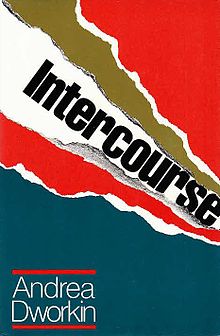
Erotica is literature or art that deals substantively with subject matter that is erotic, sexually stimulating or sexually arousing. Some critics regard pornography as a type of erotica, but many consider it to be different. Erotic art may use any artistic form to depict erotic content, including painting, sculpture, drama, film or music. Erotic literature and erotic photography have become genres in their own right. Erotica also exists in a number of subgenres including gay, lesbian, women's, bondage, monster and tentacle erotica.

Eroticism is a quality that causes sexual feelings, as well as a philosophical contemplation concerning the aesthetics of sexual desire, sensuality, and romantic love. That quality may be found in any form of artwork, including painting, sculpture, photography, drama, film, music, or literature. It may also be found in advertising. The term may also refer to a state of sexual arousal or anticipation of such – an insistent sexual impulse, desire, or pattern of thoughts.

Larry Claxton Flynt Jr. was an American publisher and the president of Larry Flynt Publications (LFP). LFP mainly produces pornographic magazines, such as Hustler, pornographic videos, and three pornographic television channels named Hustler TV. Flynt fought several high-profile legal battles involving the First Amendment, and unsuccessfully ran for public office. He was paralyzed from the waist down due to injuries sustained in a 1978 assassination attempt by serial killer Joseph Paul Franklin. In 2003, Arena magazine listed him at No. 1 on the "50 Powerful People in Porn" list.

Sexual objectification is the act of treating a person solely as an object of sexual desire. Objectification more broadly means treating a person as a commodity or an object without regard to their personality or dignity. Objectification is most commonly examined at the level of a society, but can also refer to the behavior of individuals and is a type of dehumanization.
The sex-positive movement is a social and philosophical movement that seeks to change cultural attitudes and norms around sexuality, promoting the recognition of sexuality as a natural and healthy part of the human experience and emphasizing the importance of personal sovereignty, safer sex practices, and consensual sex. It covers every aspect of sexual identity including gender expression, orientation, relationship to the body, relationship-style choice, and reproductive rights. Sex-positivity is "an attitude towards human sexuality that regards all consensual sexual activities as fundamentally healthy and pleasurable, encouraging sexual pleasure and experimentation." It challenges societal taboos and aims to promote healthy and consensual sexual activities. The sex-positive movement also advocates for comprehensive sex education and safe sex as part of its campaign. The movement generally makes no moral distinctions among types of sexual activities, regarding these choices as matters of personal preference.
Sex-positive feminism, also known as pro-sex feminism, sex-radical feminism, or sexually liberal feminism, is a feminist movement centering on the idea that sexual freedom is an essential component of women's freedom. They oppose legal or social efforts to control sexual activities between consenting adults, whether they are initiated by the government, other feminists, opponents of feminism, or any other institution. They embrace sexual minority groups, endorsing the value of coalition-building with marginalized groups. Sex-positive feminism is connected with the sex-positive movement. Sex-positive feminism brings together anti-censorship activists, LGBT activists, feminist scholars, producers of pornography and erotica, among others. Sex-positive feminists believe that prostitution can be a positive experience if workers are treated with respect, and agree that sex work should not be criminalized.

Reasons for opposition to pornography include religious objections and feminist concerns, as well as alleged harmful effects, such as pornography addiction. Pornography addiction is not a condition recognized by the DSM-5, or the ICD-11. Anti-pornography movements have allied disparate social activists in opposition to pornography, from social conservatives to harm reduction advocates. The definition of "pornography" varies between countries and movements, and many make distinctions between pornography, which they oppose, and erotica, which they consider acceptable. Sometimes opposition will deem certain forms of pornography more or less harmful, while others draw no such distinctions.
Incest pornography is a genre of pornography involving the depiction of sexual activity between relatives. Incest pornography can feature actual relatives, but the main type of this pornography is fauxcest, which features non-related actors to suggest family relationship. This genre includes characters with various levels of kinship, including siblings, first cousins, aunts, uncles, parent(s), offspring, nieces and nephews. In many countries, incest pornography amounts to illegal pornography.
Fat fetishism or adipophilia is a sexual attraction directed towards overweight or obese people due primarily to their weight and size.

Male prostitution is a form of sex work consisting of act or practice of men providing sexual services in return for payment. Although clients can be of any gender, the vast majority are older males looking to fulfill their sexual needs. Male prostitutes have been far less studied than female prostitutes by researchers. Even so, male prostitution has an extensive history including regulation through homosexuality, conceptual developments on sexuality, and the HIV/AIDS epidemic impact. In the last century, male sex work has seen various advancements such as popularizing new sexual acts, methods of exchange, and carving out a spot in cinema.

Intercourse is the fifth nonfiction book by American radical feminist writer and activist Andrea Dworkin. It was first published in 1987 by Free Press. In Intercourse, Dworkin presents a radical feminist analysis of sexual intercourse in literature and society.

Laura Kipnis, is an American cultural critic, essayist, educator, and former video artist. Her work focuses on sexual politics, gender issues, aesthetics, popular culture, and pornography. She began her career as a video artist, exploring similar themes in the form of video essays. She is professor of media studies at Northwestern University in the department of radio-TV-film, where she teaches filmmaking. In recent years she has become known for debating sexual harassment, and free speech policies in higher education.
Sheila Jeffreys is a former professor of political science at the University of Melbourne, born in England. A lesbian feminist scholar, she analyses the history and politics of human sexuality.
The feminist sex wars, also known as the lesbian sex wars, sex wars or porn wars, are collective debates amongst feminists regarding a number of issues broadly relating to sexuality and sexual activity. Differences of opinion on matters of sexuality deeply polarized the feminist movement, particularly leading feminist thinkers, in the late 1970s and early 1980s and continue to influence debate amongst feminists to this day.
Feminist sexology is an offshoot of traditional studies of sexology that focuses on the intersectionality of sex and gender in relation to the sexual lives of women. Sexology has a basis in psychoanalysis, specifically Freudian theory, which played a big role in early sexology. This reactionary field of feminist sexology seeks to be inclusive of experiences of sexuality and break down the problematic ideas that have been expressed by sexology in the past. Feminist sexology shares many principles with the overarching field of sexology; in particular, it does not try to prescribe a certain path or "normality" for women's sexuality, but only observe and note the different and varied ways in which women express their sexuality. It is a young field, but one that is growing rapidly.
Feminism has affected culture in many ways, and has famously been theorized in relation to culture by Angela McRobbie, Laura Mulvey and others. Timothy Laurie and Jessica Kean have argued that "one of [feminism's] most important innovations has been to seriously examine the ways women receive popular culture, given that so much pop culture is made by and for men." This is reflected in a variety of forms, including literature, music, film and other screen cultures.

Gail Dines is professor emerita of sociology and women's studies at Wheelock College in Boston, Massachusetts.
Feminist pornography is a genre of film developed by or for those within the sex-positive feminist movement. It was created for the purpose of promoting gender equality by portraying more bodily movements and sexual fantasies of women and members of the LGBT community.

The socio-political movements and ideologies of feminism have found expression in various media. These media include newspaper, literature, radio, television, social media, film, and video games. They have been essential to the success of many feminist movements.

King Kong Theory is a book by filmmaker and novelist Virginie Despentes, first published in French in 2006 by Grasset. English-language editions have been published in 2010 by The Feminist Press and in 2020 by Fitzcarraldo Editions.











